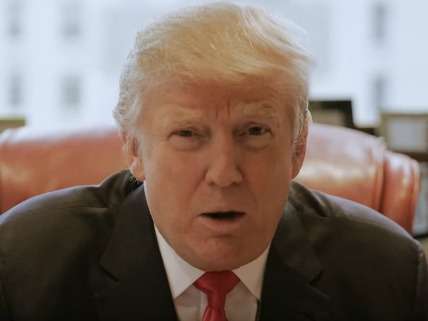Trump Reiterates His Call for a Ban on Muslim Immigrants Because a Tiny Percentage Are 'Implicated in Terrorism'
The presumptive Republican presidential nominee exaggerates both the number of immigrants and the number who pose a domestic threat.

Donald Trump says yesterday's attack on a gay night club in Orlando, which was carried out by the son of Afghan immigrants, shows the wisdom of his proposed ban on Muslims entering the United States. "What has happened in Orlando is just the beginning," the presumptive Republican presidential nominee declared on Twitter. "Our leadership is weak and ineffective. I called it and asked for the ban. Must be tough." In a separate statement on his campaign website, Trump said:
We admit more than 100,000 lifetime migrants from the Middle East each year. Since 9/11, hundreds of migrants and their children have been implicated in terrorism in the United States.
Hillary Clinton wants to dramatically increase admissions from the Middle East, bringing in many hundreds of thousands during a first term—and we will have no way to screen them, pay for them, or prevent the second generation from radicalizing.
Taking Trump at his word, it looks like very few immigrants from the Middle East are involved in terrorism. He claims that 100,000 Middle Eastern immigrants legally enter the United States each year, which means something like 1.5 million have arrived since the 9/11 attacks, and that "hundreds of migrants and their children" have been "implicated in terrorism" during the same period. That means no more than 0.07 percent of immigrants from the Middle East either are accused of involvement in terrorism or have children who are. In that light, a total ban on Muslims entering the United States (including Muslims from outside the Middle East) looks like overkill, to say the least.
But Trump seems to be exaggerating both the number of immigrants from the Middle East and the number involved in "terrorism in the United States." According to the State Department, about 28,000 immigrant visas were issued to people from the Middle East last year, and during the previous nine years the number never exceeded 32,000. Including refugees and asylees from the Middle East would add another 23,000 or so, making the total for last year around 51,000, still far short of the "more than 100,000" claimed by Trump.
Either way, the percentage of Middle Eastern migrants tied to terrorism (either directly or through their children) is minuscule. Furthermore, it's not clear what Trump means by "implicated in terrorism in the United States." Although that phrasing makes it sound like these immigrants were involved in planning or executing attacks within the United States, that does not seem to be the case for most of them.
Last December, Sen. Jeff Sessions (R-Ala.), a leading Trump supporter, released a list of about three dozen immigrants, refugees, and legal visitors who were "recently implicated in terrorist activities," only one-third of whom were accused of planning or carrying out attacks against targets in the United States. Sessions' list included charges or incidents from 2012 through 2015, and it featured defendants from Pakistan, Afghanistan, Bangladesh, Somalia, Ghana, Sudan, Morocco, Bosnia, Kazakhstan, and Uzbekistan as well as several Middle Eastern countries. But assuming that Trump's idea of "implicated in terrorism in the United States" is similar to Sessions', the percentage of Middle Eastern immigrants who pose a threat to targets in the United States is even tinier than his numbers imply.
I have contacted the Trump campaign about the sources of his numbers and will update this post if and when I receive a response.
Update: Washington Post fact checkers Glenn Kessler and Michelle Ye Hee Lee note that about 76,000 people from Middle Eastern countries were granted permanent resident status in 2014. "You get to around 100,000 only by including Afghanistan and Pakistan, which of course are outside the traditional 'Middle East,'" they write. Even if you ignore that distinction, it is still not true that "we admit more than 100,000 lifetime migrants from the Middle East each year," as Trump said in his statement. In a subsequent speech, he changed the phrasing: "Each year, the United States permanently admits more than 100,000 immigrants from the Middle East, and many more from Muslim countries outside the Middle East." That's closer to the truth, assuming the government "permanently admits" an immigrant not when he arrives but when he gets his green card, although Trump still has to count Afghanistan and Pakistan as Middle Eastern countries.


Show Comments (184)